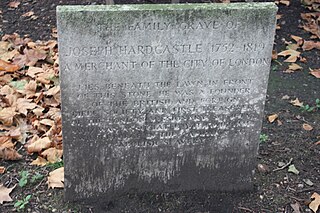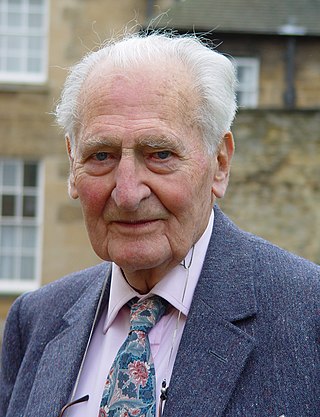
The Keeper or Master of the Rolls and Records of the Chancery of England, known as the Master of the Rolls, is the President of the Civil Division of the Court of Appeal of England and Wales and Head of Civil Justice. As a judge, the Master of the Rolls is second in seniority in England and Wales only to the Lord Chief Justice. The position dates from at least 1286, although it is believed that the office probably existed earlier than that.

Joseph Hardcastle (1752–1819) was an English merchant. One of the founders of the Missionary Society, later the London Missionary Society, he devoted time and money to its affairs, becoming its first treasurer.

The Buchanan Medal is awarded by the Royal Society "in recognition of distinguished contribution to the medical sciences generally". The award was created in 1897 from a fund to the memory of London physician Sir George Buchanan (1831–1895). It was to be awarded once every five years, but since 1990 the medal has been awarded every two years.

The British Critic: A New Review was a quarterly publication, established in 1793 as a conservative and high-church review journal riding the tide of British reaction against the French Revolution. The headquarters was in London. The journal ended publication in 1843.

The British Poet Laureate is an honorary position appointed by the monarch of the United Kingdom, currently on the advice of the prime minister. The role does not entail any specific duties, but there is an expectation that the holder will write verse for significant national occasions. The origins of the laureateship date back to 1616 when a pension was provided to Ben Jonson, but the first official holder of the position was John Dryden, appointed in 1668 by Charles II. On the death of Alfred, Lord Tennyson, who held the post between November 1850 and October 1892, there was a break of four years as a mark of respect; Tennyson's laureate poems "Ode on the Death of the Duke of Wellington" and "The Charge of the Light Brigade" were particularly cherished by the Victorian public. Four poets, Thomas Gray, Philip Larkin, Samuel Rogers and Walter Scott, turned down the laureateship. Historically appointed for an unfixed term and typically held for life, since 1999, the position is for a term of ten years.

The Lieutenant of the Tower of London serves directly under the Constable of the Tower. The office has been appointed at least since the 13th century. There were formerly many privileges, immunities and perquisites attached to the office. Like the Constable, the Lieutenant was usually appointed by letters patent, either for life or during the King's pleasure.

Justice of the Common Pleas was a puisne judicial position within the Court of Common Pleas of England and Wales, under the Chief Justice. The Common Pleas was the primary court of common law within England and Wales, dealing with "common" pleas. It was created out of the common law jurisdiction of the Exchequer of Pleas, with splits forming during the 1190s and the division becoming formal by the beginning of the 13th century. The court became a key part of the Westminster courts, along with the Exchequer of Pleas and the Court of King's Bench, but with the Writ of Quominus and the Statute of Westminster, both tried to extend their jurisdiction into the realm of common pleas. As a result, the courts jockeyed for power. In 1828 Henry Brougham, a Member of Parliament, complained in Parliament that as long as there were three courts unevenness was inevitable, saying that "It is not in the power of the courts, even if all were monopolies and other restrictions done away, to distribute business equally, as long as suitors are left free to choose their own tribunal", and that there would always be a favourite court, which would therefore attract the best lawyers and judges and entrench its position. The outcome was the Supreme Court of Judicature Act 1873, under which all the central courts were made part of a single Supreme Court of Judicature. Eventually the government created a High Court of Justice under Lord Coleridge by an Order in Council of 16 December 1880. At this point, the Common Pleas formally ceased to exist.

The position of Dean Ireland's Professor of the Exegesis of Holy Scripture was established at the University of Oxford in 1847. This professorship in the critical interpretation or explanation of biblical texts, a field known as exegesis, was instituted by John Ireland, who was Dean of Westminster from 1816 until his death in 1842. He founded scholarships in his lifetime at the University of Oxford, which are still awarded after an examination to undergraduates "for the promotion of classical learning and taste". In his will, he left £10,000 to the university, with the interest arising to be applied to the professorship. The first professor, Edward Hawkins, was appointed in 1847. The second Dean Ireland's Professor, Robert Scott, had won an Ireland scholarship in 1833 while studying at Christ Church.
Edward William Grinfield (1785–1864) was an English biblical scholar.
The Monthly Mirror was an English literary periodical, published from 1795 to 1811, founded by Thomas Bellamy, and later jointly owned by Thomas Hill and John Litchfield. It was published by Vernor & Hood from the second half of 1798.
The Phytologist was a British botanical journal, appearing first as Phytologist: a popular botanical miscellany. It was founded in 1841 as a monthly, edited by George Luxford. Luxford died in 1854, and the title was taken over by Alexander Irvine and William Pamplin, who ran it to 1863 with subtitle "a botanical journal".